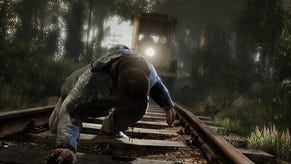Dear Esther Landmark Edition Brings PC Improvements
Walk this way
It's been a good four years since the remake of Dear Esther [official site] took us to a spooky-ooky Hebridean island but we're going a-wandering again soon. Remastered audio, an audio commentary from its makers, and more are coming our way thanks to a new version created for Dear Esther's console release as a 'Landmark Edition' - which will be a free update on PC.
The new version of Dear Esther is mostly the same but rebuilt in the Unity 5 engine, ported over from Valve's Source engine. According to developers The Chinese Room today's announcement, this version will boast a commentary from Jessica Curry, Robert Briscoe, and Dan Pinchbeck, new translations of the menu and subtitles, and a few extra accessibility options like larger subtitles and a crosshair. They've said before that it'd have "a few tweaks and bug fixes" too.
They're not super-massive changes but hey, we're getting them free as a fringe benefit of new console ports. The Chinese Room say the update will come to Windows and Mac "in a few months".
It strikes me as a bit of a shame to leave Source, as part of Dear Esther's appeal to me is its roots as a free mod. That's Old Alice and her niche historical interests for you.
Dear Esther's console publishers, Curve Digital, have announced a few events in that there London as a "celebration of its legacy". That Guardian rabble will chat with Dan Pinchbeck and The Barbican's hosting a live playthrough with live music and narration.
Ah, this is a funny situation to me. In retrospect, Dear Esther is pleasant enough, if a bit wanky and not enough of a walking simulator for my tastes. It absolutely helped open up space for - or raise awareness of, same-ish thing - more fringe video games. But I'm frustrated that the arm of Big Culture which still considers "Are games art?" an interesting question is mostly interested in games resembling more traditional mediums. Dear Esther is set in a picturesque landscape, it's pricked with Biblical references, splashed with poetry, it has a (really nice!) orchestral soundtrack, and... it's very Traditional Art.
I'm not saying Dear Esther is bad. I'm just frustrated that our medium is so insecure and tries to find mainstream legitimacy mostly either by boasting we're bigger than Star Wars or highlighting things which kinda look like Proper Art if you squint. I'm not saying that's Dear Esther's fault either.
Dear Esther's legacy is that it led to better, weirder, more interesting games that I'd rather have as our ambassadors. Until those can get a Guardian discussion and a live playthrough at the Barbican, talking about Dear Esther's legacy seems short-sighted.











